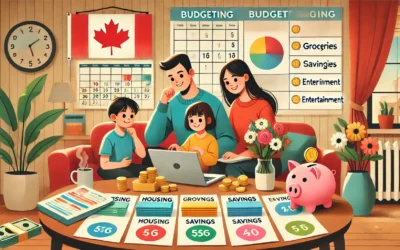Managing personal finances can be challenging for anyone, but single parents often face unique hurdles that require careful planning and resourcefulness. As a single parent in Canada, you’re tasked with balancing the household budget, planning for your children’s future, and securing your own financial well-being. This comprehensive guide offers practical tips to help you navigate these responsibilities with confidence and ease.
1. Create a Detailed Single Parent Budget in Canada
Why Budgeting Matters
Budgeting is the cornerstone of sound financial management. For single parents, it’s especially critical to have a clear understanding of your income and expenses.
Steps to Create a Single Parent Budget in Canada
- Track Your Income and Expenses: Start by listing all sources of income and all monthly expenses. Use budgeting apps like Mint or YNAB to simplify the process.
- Categorize Your Expenses: Divide your expenses into fixed (rent/mortgage, utilities) and variable (groceries, entertainment) categories.
- Set Financial Goals: Define short-term and long-term goals, such as saving for a vacation or building an emergency fund.
- Adjust and Monitor: Regularly review your budget and make adjustments as needed to stay on track.
2. Maximize Government Benefits for Single Parents in Canada
Canadian Government Programs
Single parents in Canada have access to several government benefits designed to provide financial support.
- Canada Child Benefit (CCB): A tax-free monthly payment to eligible families to help with the cost of raising children under 18.
- GST/HST Credit: A tax-free quarterly payment that helps individuals and families with low or modest incomes offset the GST or HST they pay.
- Child Disability Benefit (CDB): Provides financial assistance to families caring for children with disabilities.
How to Apply for Government Benefits for Single Parents in Canada
Ensure you file your taxes every year, as eligibility for these benefits is determined based on your income tax return. Visit the Canada Revenue Agency (CRA) website for detailed information and application procedures.
3. Build an Emergency Fund
Importance of an Emergency Fund
An emergency fund acts as a financial safety net, providing peace of mind in case of unexpected expenses, such as car repairs or medical emergencies.
How to Start
- Set a Target Amount: Aim to save three to six months’ worth of living expenses.
- Automate Savings: Set up automatic transfers to a high-interest savings account to build your fund consistently.
- Start Small: Even small, regular contributions can grow significantly over time.
4. Plan for Retirement
Registered Retirement Savings Plan (RRSP)
An RRSP is a tax-advantaged account designed to help Canadians save for retirement.
Benefits of an RRSP for Single Parents in Canada
- Tax Deductions: Contributions are tax-deductible, reducing your taxable income.
- Tax-Deferred Growth: Investments grow tax-free until withdrawal.
- Home Buyers’ Plan: Allows first-time homebuyers to withdraw up to $35,000 tax-free for a down payment.
Tips for Single Parents
- Start Early: The sooner you start contributing, the more time your investments have to grow.
- Consistent Contributions: Make regular contributions, even if they’re small.
5. Invest in Your Children’s Education with an RESP for Single Parents in Canada
Registered Education Savings Plan (RESP)
An RESP is a tax-deferred savings plan that encourages saving for your child’s post-secondary education.
Government Contributions
- Canada Education Savings Grant (CESG): The government matches 20% of annual contributions, up to $500 per year.
- Canada Learning Bond (CLB): Provides up to $2,000 for children born into low-income families.
How to Maximize RESP Benefits for Single Parents in Canada
- Start Early: The earlier you start, the more you benefit from compound growth and government contributions.
- Contribute Regularly: Consistent contributions can maximize the annual CESG.
6. Manage Debt Wisely
Types of Debt
Understanding the difference between good debt (mortgage, student loans) and bad debt (credit card balances, payday loans) is crucial.
Debt Repayment Strategies
- Debt Snowball Method: Focus on paying off the smallest debts first, then move on to larger ones.
- Debt Avalanche Method: Prioritize paying off debts with the highest interest rates first.
Tips for Single Parents
- Negotiate Lower Interest Rates: Contact creditors to negotiate lower interest rates or better repayment terms.
- Seek Professional Advice: Consult a financial advisor if you’re overwhelmed by debt.
7. Utilize Community Resources
Local Support Programs
Many communities offer resources and programs that can help single parents manage their finances and support their families.
- Food Banks: Provide groceries and essential items.
- Subsidized Childcare: Reduced-cost childcare programs can ease the financial burden.
- Financial Counseling Services: Offer personalized advice and support.
How to Find Resources
Check with local community centers, libraries, and non-profit organizations for information on available programs.
Conclusion
Navigating personal finances as a single parent in Canada can be challenging, but with careful planning and the right resources, you can achieve financial stability and security for you and your family. By creating a detailed single parent budget in Canada, maximizing government benefits for single parents in Canada, building an emergency fund, planning for retirement, investing in your children’s education with an RESP for single parents in Canada, managing debt wisely, and utilizing community resources, you’ll be well on your way to a brighter financial future.
Remember, you’re not alone on this journey. Reach out for support when needed, and take proactive steps to secure your financial well-being. Your efforts today will lay a strong foundation for your family’s future.



